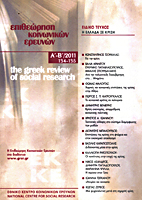Economic Crisis and Social Policy Deregulation: The New «Greece Minor Disaster» 2010-2011
Abstract
The aim of this paper is to investigate the influence of the national political absurdity and the effect of the global economic crisis on social policy in the bankrupt Greece of 2010-11. All this is modulated by a hybrid model of decision making which is enforced by the markets, is determined by the supranational lenders and is quasi-implemented by the national administration. This is a multidimensional mutual influence which is approached through different academic disciplines with political economy at the core, and is spread to several levels with society sacrificed for market economy. The analysis will focus on the outcome of this urgent situation on the corrupt and decayed Greek social policy during this momentous period. Decisions were taken under overwhelming pressure, were enforced violently and are in contrast to a rapidly aggravating social reality. Decisions however, which have a permanent and antisocial nature… The new Greek ‘social policy’ of 2011-15 has been shaped under the immense compulsion of the EU and the IMF. It deteriorates social rights and intensifies individual duties. It is an austerity policy counteracting an equalizing social policy, which –either generous and decent, or residual and inadequate– is justified only in case it is fair and efficient. In other words, only in case it promotes social justice and it makes rational use of scarce resources. This study is based on original documents and secondary sources and analyses the radical changes in social policy in the era of crisis in the fields of social insurance, health, social assistance and employment.
Article Details
- How to Cite
-
Βενιέρης Δ. (2011). Economic Crisis and Social Policy Deregulation: The New «Greece Minor Disaster» 2010-2011. The Greek Review of Social Research, 134, 101–131. https://doi.org/10.12681/grsr.32
- Issue
- 2011: 134-135, A-B
- Section
- Articles

This work is licensed under a Creative Commons Attribution-NonCommercial 4.0 International License.
Authors who publish with this journal agree to the following terms:
- Authors retain copyright and grant the journal right of first publication with the work simultaneously licensed under a Creative Commons Attribution Non-Commercial License that allows others to share the work with an acknowledgement of the work's authorship and initial publication in this journal.
- Authors are able to enter into separate, additional contractual arrangements for the non-exclusive distribution of the journal's published version of the work (e.g. post it to an institutional repository or publish it in a book), with an acknowledgement of its initial publication in this journal.
- Authors are permitted and encouraged to post their work online (preferably in institutional repositories or on their website) prior to and during the submission process, as it can lead to productive exchanges, as well as earlier and greater citation of published work (See The Effect of Open Access).
Downloads
Download data is not yet available.



